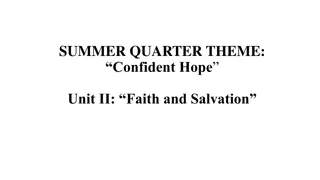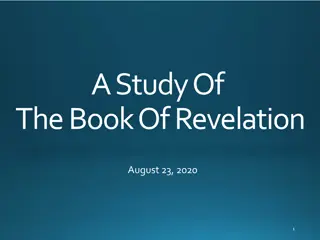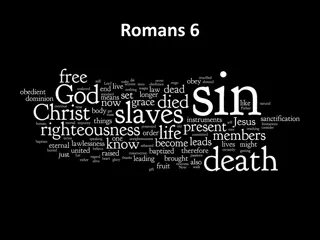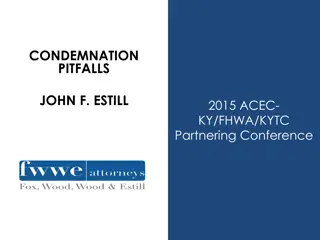Understanding Just Condemnation in Romans 3:1-20
Delve into the discussion on the faithlessness of the privileged Jewish people and its perceived effects on God's faithfulness in Romans 3:1-20. Explore objections refuted by Paul's teachings and the concept of honored privileges implying duties and responsibilities. Reflect on the parallels drawn between Jewish inheritance and contemporary Christian practices, highlighting profound questions on justice and righteousness.
Download Presentation

Please find below an Image/Link to download the presentation.
The content on the website is provided AS IS for your information and personal use only. It may not be sold, licensed, or shared on other websites without obtaining consent from the author. Download presentation by click this link. If you encounter any issues during the download, it is possible that the publisher has removed the file from their server.
E N D
Presentation Transcript
A Just Condemnation! OIF Adult Sunday Training Romans 3:1-20 OCT. 12,2014 Raymond B. Orr A Sneak Preview Lesson Lesson #1 #1
A Just Condemnation! 1Then what advantage has the Jew? Or what is the value of circumcision? 2Much in every way. To begin with, the Jews were entrusted with the oracles of God. 3What if some were unfaithful? Does their faithlessness nullify the faithfulness of God? 4By no means! Let God be true though everyone were a liar, as it is written, That you may be justified in your words, and prevail when you are judged. 5But if our unrighteousness serves to show the righteousness of God, what shall we say? That God is unrighteous to inflict wrath on us? (I speak in a human way.) 6By no means! For then how could God judge the world? 7But if through my lie God s truth abounds to his glory, why am I still being condemned as a sinner? 8And why not do evil that good may come? -- as some people slanderously charge us with saying. Their condemnation is just. (ESV 3:1-8)
Issues Raised: Does the faithlessness of the privileged Jewish people nullify the faithfulness of God? (v.3) --- Not at all! Is God wrong to condemn if our unrighteousness serves to bring forth the righteousness of God? (v.5) --- Not at all! Should it be justifiable for people to do evil so that good may come from it? (v.8) --- Not at all! God Forbid!
Objections Refuted (3:1-8) 1) Paul s teaching undermines God s covenant 2) Paul s teaching nullifies God s faithfulness, 3) Paul s teaching alleges that God s justice is faulty, 4) Paul s teaching falsely promotes God s glory. (John Stott Romans Commentary)
Honored Privileges Imply Duties & Responsibilities. Those who are untrustworthy should expect God to be faithful to his threats as much as he is to his divine promises of special blessing. (v.4) Rom. 3:8 is answered more fully later on in Rom. 6:1, Are we to continue in sin that grace may abound. For instance: gambling casinos, sex before marriage, taking credit using someone else s work, looking the other way in the face of evil -- (Such subtle deceptions!) In actual fact, God s righteousness stands out all the more in contrast to the dark background of human sin Shall not the Judge of all the earth deal justly? (Gen. 18:25) (Rembrandt s Night Watch ).
A contemporary parallel to the Jewish inherited birthright: I am a Jew. I am a Christian. I was born into the nation Israel. I was born in a Christian family. I am a child of the covenant community. I am member of the church community. I was circumcised the eighth day. I was baptized as an infant or as an adult. I regularly pay the temple tax. I regularly give a tithe. I give alms as a faithful Jew. I give to charities as a Christian. I regularly take part in the Passover. I regularly receive the sacrament of holy communion. I am a Jewish rabbi, a teacher of God s Law. I am a Christian leader, a teacher of God s Holy word.
A Just Condemnation! Entrusted withthe Oracles of God (v.2) For I bear them witness that they have a zeal for God, but not according to knowledge. For, being ignorant of the righteousness of God, and seeking to establish their own, they did not submit to God s righteousness. (Rom. 10:1-3)
Sins Consequence (Rom. 3.9-20) 9 What then? Are we Jews any better off? No, not at all! For we have already charged that all, both Jews and Greeks, are under sin, 10as it is written: None is righteous, no, not one; 11 no one understands; no one seeks for God. 12All have turned aside; together they have become worthless; no one does good, not even one. 13Their throat is an open grave; they use their tongues to deceive. The venom of asps is under their lips. 14Their mouth is full of curses and bitterness. 15Their feet are swift to shed blood; 16in their paths are ruin and misery, 17and the way of peace they have not known. 18 There is no fear of God before their eyes. 19 Now we know that whatever the law says it speaks to those who are under the law, so that every mouth may be stopped, and the whole world may be held accountable to God. 20For by works of the law no human being will be justified in his sight, since through the law comes knowledge of sin. (Rom. 3:9-20)
Psalms, Isaiah & Ecclesiastes In vs.10-12 we are confronted with the universality and deplorable pervasiveness of sin (Ecc. 7:20, Ps. 14:1-3, 53:1-3). Paul s use of law here most probably relates to the whole of the O.T. and not to a more restricted meaning In vs.13-14 Paul uses the specific example of the sin of the tongue (Ps. 5:9 ; 140:3 ; 10:7). Overall there are 6 bodily parts used to illustrate our sinfulness (feet, eyes & 4 parts dealing with speech) In vs.15-18 Paul addresses the sinful ways in which we conduct our lives (Isa.59:7, 8 Ps.36:1). Human war provides us with a blatant example, but sin manifests in more subtle ways as well. In vs. 19-20 the whole world signifies the inclusion of the Gentiles
The Question Revised Strangely, Paul asks the same question from before but seems to reverse his proposition concerning the Jewish advantage. He uses both the positive and negative statements to confirm that the presence of sin is overwhelmingly pervasive. When sin is present righteousness is absent. 1) Sin s essential nature does violence to the nature of God, therefore at its core resides ungodliness. 2) Sin affects the whole nature of mankind, every part for it is pervasive total depravity 3) Sin is universal &O.T. teaching confirms this.
Total Depravity Paul moves us forward toward this undeniable conclusion that all, both Jews and Gentiles alike, are under the just condemnation of sin (3:9). Who can say, I have made my heart pure; I am clean from my sin ? Surely there is not a righteous man on earth who does good and never sins. (Prov. 20:9) (Eccl. 7:20)
Sin Touches Us In Every Part Paul s universal aim is unmistakable: the human race is Totally Depraved ! All both Jews and Greeks None is No not one No one No one All have together they have No one Not even one every mouth " the whole world no human being ( no flesh )
Total Depravity Paul opposed any trust in merit, the reliance upon moral good works --- our methods of self- salvation. Transgression speaks to the wicked deep in his heart; there is no fear of God before his eyes. (Ps. 36:1) The human heart is deceitful above all things, and desperately sick; who can understand it? (Jer. 17:9)
Discussion Questions: 1. How is it consistent to say that the Jews have an advantage and yet they are not better off? 2. Discuss the true meaning of Paul s conclusions about sin (eg. the true meaning of Total Depravity ) 3. What are some contemporary parallels to Jewish trust in their inherited birthright as the basis for salvation?























